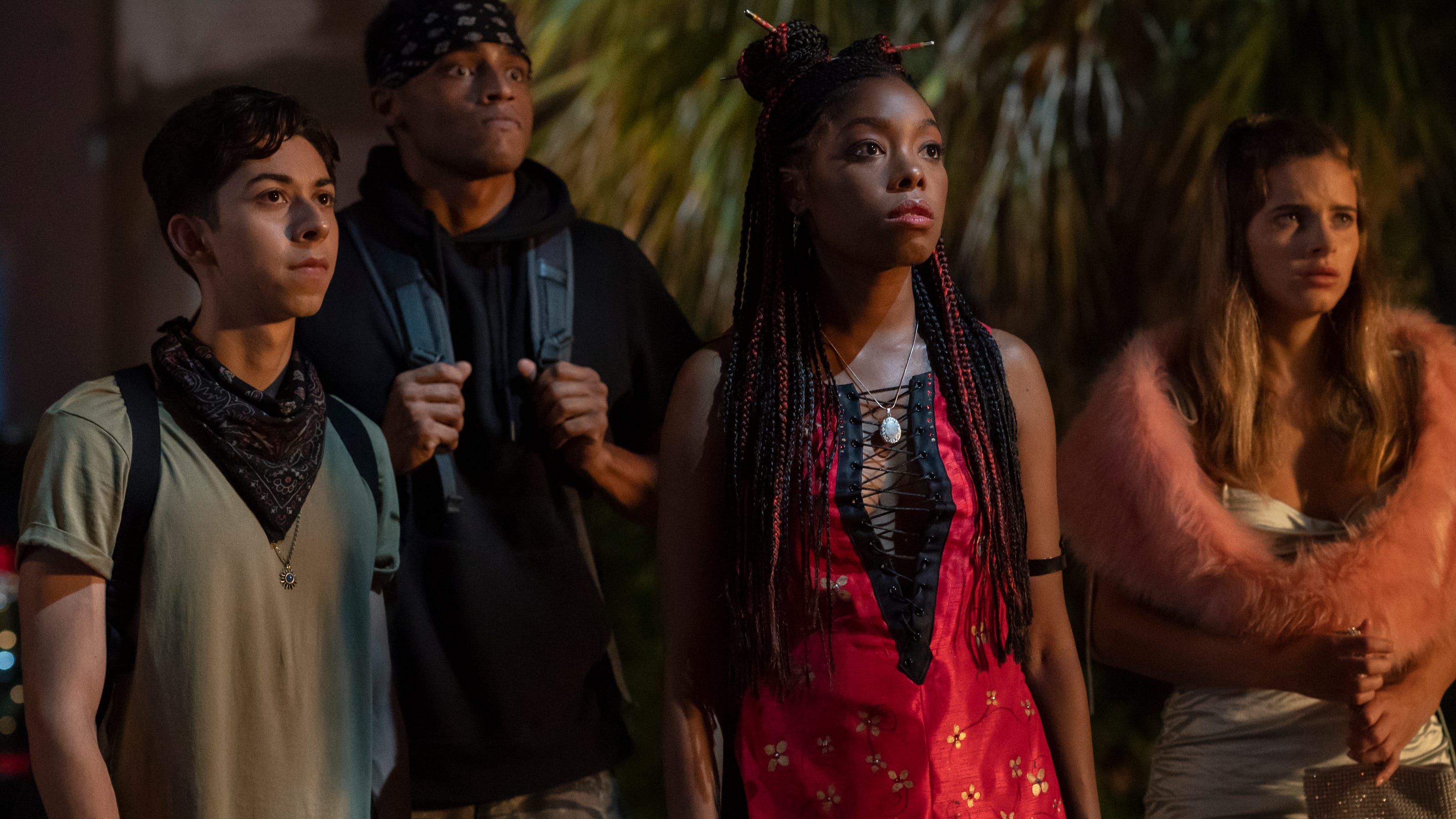What to Watch Verdict
'Black As Night' is a young adult vampire tale that does its best work addressing marginalized minorities but is lacking in horror-spectacle energy.
Pros
- +
⚜️ Slick vampire design
- +
⚜️ A workable genre entry point for younger audiences
- +
⚜️ Has fun with vampire mythology
Cons
- -
⚜️ It's playing safe too often
- -
⚜️ Stakes are basement level
- -
⚜️ Hits its shorter ceiling over and over
Maritte Lee Go’s Black as Night is young adult horror down to the LiveJournal narration and Vampires vs. the Bronx comparisons that texture this disenfranchised Louisiana vampire tale. It’s a Blumhouse Television production that favors CGI and very much aligns with the studio arm’s more limited allowances, but that won’t prevent the right demographics from smirking at Buffy callbacks and Disney Channel: After Dark vibes.
That’s no insult to those who find comfort in weaponized pizzeria garlic dispensers — Go taps into the pulsating veins of gentrification and disprivileged communities while scoring some laughs. Black as Night just struggles to fight an overall flatness that glides through narrative intrigue with detectable low stakes, even considering some refashioned historical alterations that combine slave trades with bloodsucker vengeance.
Shawna (Asjha Cooper) lives in a post-Katrina New Orleans, still ravaged by leftover memories of what families once called home. It’s summer, and Shawna just wants to sunbathe and chase romance with her best friend Pedro (Fabrizio Guido), but a vampire infestation changes plans.
Homeless denizens around the impoverished Ombreux housing complex start to bite victims after dark, around where Shawna encounters her first vamp. Shawna spends the rest of her vacation hunting whoever is creating an army in the name of vampiric supremacy, alongside Pedro, Anne Rice superfan Granya (Abbie Gayle) and hunky love interest Chris (Mason Beauchamp).
The vampires of Black as Night look the part with discolored, crowded rows of fangs and ruby red eyes that punch through the darkness. That’s the most critical element of vampire cinema — the vampires — and Go’s vision transforms forgotten New Orleans residents into stalking, furious beasts who start clawing back. It’s necessary costuming and makeup because their demises aren’t as impressive as staked creatures burst into digital ash and computerized smoke or puffs of aromatic garlic clouds float like pixelated greenish blobs. That’s the Blumhouse Television tradeoff. Claim your wins where possible, which Go’s special effects department does by summoning monsters under the moonlight that evoke their roving tribal distinctions and snarling viciousness to counterbalance the lackluster visual accents elsewhere.
Black as Night has this Fear Street Lite vibe as characters embrace their inner vampire hunters and rage against racist pasts as blood spills on former plantation grounds. You best believe Go ties the outcasting of emotionally and financially crippled New Orleans natives still shaken by Katrina’s devastation to Louisiana’s pre-abolition racial divide (the cycle continues). Go’s characters dance a line of social circle authenticity and stereotypes, from Pedro’s catty best friend zings to Chris’ fairytale entrance into Shawna’s life — but they remain devoted to the film’s tonal after-school vibes that recall textbook protests past and present. Cooper wildly succeeds as the reluctant but fearless vampire assassin leading a vocal charge, and will be many viewers’ reason for sticking around.
All that said, Black as Night still doesn’t capitalize on the rather choice conceptualization of classist terrors and vampiric metaphors that swarm around Shawna. Writer Sherman Payne lays a foundation that Go’s direction seems to summon with a ceiling that’s met often, as grave familial mistakes and these elaborate nest invasion plots lack a striking gravity. Vampire specialist Granya prattles off horror references while Shawna’s predetermined journey is done no favors by a Lizzie McGuire narration technique. I value so much of what’s ideologically presented; it’s all just chopped at the knees scene after scene, whether that's modest post-production touchups or the least surprising plot advancement time and time again.
The latest updates, reviews and unmissable series to watch and more!
There’s no way around it — Black as Night is representative, encouraging gateway horror that didn’t work for me despite my deepest desires. Horror is often defined by the feeling we’re left with after the credits roll, and I didn’t feel a whole lot of anything despite Keith David’s damnedest oratory attempts.
It’s a comedy-heavy combination of CW horror meets Tales From the Crypt and evokes the bloodstained atrocities of New Orleans’ skeletons through the centuries. It’s also sustainably one-note and never elevates itself outside of locational lavishness like satin vampire den bedsheets, suave feeders with their own “red rooms” and iron gates keeping many a mansion premises "clean." Then again, it’s meant for slumber parties and less experienced horror fans — they’ll likely have a more invigorated and effusive critique, as they should.
You can stream Black As Night on Amazon Prime Video starting Oct. 1.
Matt Donato is a Rotten Tomatoes approved film critic who stays up too late typing words for What To Watch, IGN, Paste, Bloody Disgusting, Fangoria and countless other publications. He is a member of Critics Choice and co-hosts a weekly livestream with Perri Nemiroff called the Merri Hour. You probably shouldn't feed him after midnight, just to be safe.


